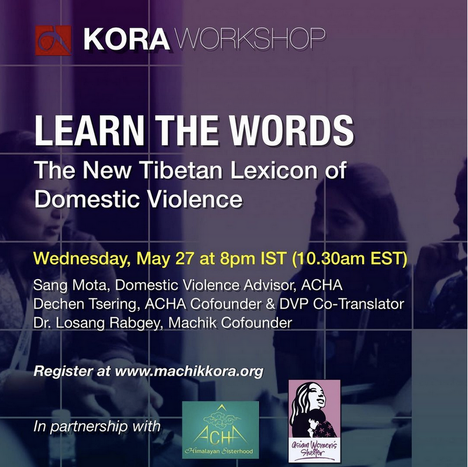KORA WORKSHOP |
The New Tibetan Lexicon of Domestic Violence
The New Tibetan Lexicon of Domestic Violence
|
Inspired by our powerful speakers at the 9th Kora on domestic violence -- Sherab Dolma (ACHA Sisterhood), Tsering Lama (Adhikaar) and Orchid Pusey (Asian Women's Shelter San Francisco) -- we were determined to grow awareness of the new Tibetan lexicon on domestic violence now being developed.
Held in Tibetan, our 10th Kora was a workshop facilitated by Dr. Tashi Rabgey and led by three longtime champions of Tibetan women's rights internationally -- Sang Mota (leading Tibetan domestic violence educator and trainer), Dechen Tsering (ACHA cofounder and co-translator of End Domestic Violence), and Dr. Losang Rabgey (Machik cofounder and PhD in gender anthropology). The Kora workshop provided an opportunity to learn key terminology translated in End Domestic Violence ( ཁྱིམ་ནང་གི་གནོད་འཚེ་མཚམས་འཇོག), a primer and Tibetan language phrasebook on domestic violence, along with some alternative translations from inside Tibet today. Machik was honored to be partnered with ACHA Himalayan Sisterhood and the Asian Women's Shelter of San Francisco in producing End Domestic Violence, and we're grateful now to be growing the circle of Tibetan speakers who embrace this new lexicon of domestic violence. We hope Tibetan speakers everywhere will help take this first step to ending domestic violence by adopting the new language of domestic violence. |
This preliminary list of new vocabulary was featured and discussed at the Kora Workshop on 5/27. The first Tibetan terms that appear (in black) are drawn from the Tibetan-English domestic violence primer and phrasebook, "End Domestic Violence" (ཁྱིམ་ནང་གི་གནོད་མཚེ་མཚམས་འཇོག). The Tibetan terminology in purple are additional translations we have gathered, drawn from sources in use inside Tibet today.
1. Domestic Violence ཁྱིམ་ནང་གི་གནོད་འཚེ། ཁྱིམ་ཚང་དྲག་སྤྱོད། ཁྱིམ་ཚང་ནང་གི་དྲག་སྤྱོད། ཁྱིམ་སྤྱོད་དྲག་ཤུགས། ནང་ཚང་གི་དྲག་སྤྱོད།
2. Sexual abuse ཆགས་པའི་བརྙས་བཅོས། ཆགས་སྤྱོད་བརྙས་བཅོས། འཁྲིག་སྤྱོད་ཀྱི་བརྙས་བཅོས། ཆགས་སྤྱོད་ཀྱི་སྡུག་སྤྱོད། ཆགས་པའི་མནར་གཅོད། ལུས་འབྲེལ་གྱི་མནར་གཅོད།
3. Marital rape བཟའ་ཟླའི་བཙན་གཡེམ་བྱེད་པ།
4. Psychological abuse སེམས་ཁམས་ཀྱི་མནར་གཅོད།
5. Social Abuse སྤྱི་ཚོགས་མནར་གཅོད།
6. Physical Abuse ལུས་པོའི་མནར་གཅོད། གཟུགས་པོའི་མནར་གཅོད།
7. Financial abuse དཔལ་འབྱོར་ཐོག་ནས་སྡུག་གཅོང་། དཔལ་འབྱོར་མནར་གཅོད།
8. Trauma སེམས་ནད། རྨས་སྐྱོན།
9. Blame སྐྱོན་འཛུགས་པ། ལེ་བདའ། ཁ་རྡུང་གཏོང་བ། ཁག་དཀྲི་བ།
10. Sex Education ཆགས་པ་དང་འབྲེལ་བའི་སློབ་སྦྱོང་། འཁྲིག་སྤྱོད་སློབ་གསོ། ཆགས་སྤྱོད་སྐོར་གྱི་སློབ་གསོ།
11. Defensive འཛེམ་ཟོན། དོགས་ཟོན། རང་སྲུང་། འགོག་སྲུང་། སྲུང་སྐྱོབ།
12. Shelter ཉེན་སྐྱོབ་ཁང་། ཉེན་བྱོལ་ཁང་། གནོད་འབྱོལ་ཁང་། སྐྱབས་གནས། སྐྱབས་བཅོལ་ཁང་།
13. To advocate ཐབས་འཚོལ་བྱེད་པ། རྒྱབ་རྟེན་བྱེད་པ། ཕྱོགས་སུ་འཛིན་པ།
14. To empower ནུས་ཤུགས་སྤེལ་བ། འགན་དབང་སྤྲོད་པ། དབང་བཅོལ།
15. To break གཅད་པ། མེད་པ་བཟོ་བ། རྒོལ་བ།
16. Peer Counseling ངོ་ཤེས་སློབ་སྟོན། ལོ་མཉམ་སློབ་སྟོན། ན་མཉམ་གྲོགས་པོས་སེམས་ཁམས་འདྲི་སྟོན།
17. Anti-violence གནོད་འཚེ་ཡང་ན་དྲག་སྤྱོད་ལ་རྒྱབ་འགལ། དྲག་སྤྱོད་ལ་ངོ་རྒོལ། དྲག་སྤྱོད་འགོག་རྒོལ།
18. Resilience བློ་སྟོབས། ལྡེམ་འཁྱུག སླར་གསོ། དཀའ་ཚེགས་དང་གེགས་ལས་མྱུར་བར་གྲོལ་ཐབས་ཀྱི་ནུས་པ།
19. Confidential གསང་བ།
20. Risk Assessment ཉེན་ཁ་ཞིབ་དཔྱད།
21. Crisis Intervention ཉེན་ཁར་ཐེ་གཏོགས།
22. Counsellor མཛུབ་སྟོན་པ།
23. Emotional support སེམས་འགུལ་རྒྱབ་སྐོར།
24. Safety plan བདེ་འཇགས་འཆར་གཞི།
25. Guilty གནོང་འགྱོད། ཉེས་པ་ཡོད་པ།
26. Depression སེམས་ཞུམ་པ།
27. Suppressive Feeling གཉའ་གནོན་གྱི་ཚོར་བ། དབང་གནོན་གྱི་ཚོར་བ།
28. Self-care རང་ལ་སྐྱེད་སྲིང་བྱ་བ། རང་ལ་དོ་ཁུར་བྱ་བ།
Very special thanks to Sherab Dolma -- primary translator and inspiration for "End Domestic Violence" -- who was not able to attend this workshop. "End Domestic Violence" was made possible through the leadership and great spirit of Dechen Tsering. To learn more about ACHA Himalayan Sisterhood, please visit their website.
1. Domestic Violence ཁྱིམ་ནང་གི་གནོད་འཚེ། ཁྱིམ་ཚང་དྲག་སྤྱོད། ཁྱིམ་ཚང་ནང་གི་དྲག་སྤྱོད། ཁྱིམ་སྤྱོད་དྲག་ཤུགས། ནང་ཚང་གི་དྲག་སྤྱོད།
2. Sexual abuse ཆགས་པའི་བརྙས་བཅོས། ཆགས་སྤྱོད་བརྙས་བཅོས། འཁྲིག་སྤྱོད་ཀྱི་བརྙས་བཅོས། ཆགས་སྤྱོད་ཀྱི་སྡུག་སྤྱོད། ཆགས་པའི་མནར་གཅོད། ལུས་འབྲེལ་གྱི་མནར་གཅོད།
3. Marital rape བཟའ་ཟླའི་བཙན་གཡེམ་བྱེད་པ།
4. Psychological abuse སེམས་ཁམས་ཀྱི་མནར་གཅོད།
5. Social Abuse སྤྱི་ཚོགས་མནར་གཅོད།
6. Physical Abuse ལུས་པོའི་མནར་གཅོད། གཟུགས་པོའི་མནར་གཅོད།
7. Financial abuse དཔལ་འབྱོར་ཐོག་ནས་སྡུག་གཅོང་། དཔལ་འབྱོར་མནར་གཅོད།
8. Trauma སེམས་ནད། རྨས་སྐྱོན།
9. Blame སྐྱོན་འཛུགས་པ། ལེ་བདའ། ཁ་རྡུང་གཏོང་བ། ཁག་དཀྲི་བ།
10. Sex Education ཆགས་པ་དང་འབྲེལ་བའི་སློབ་སྦྱོང་། འཁྲིག་སྤྱོད་སློབ་གསོ། ཆགས་སྤྱོད་སྐོར་གྱི་སློབ་གསོ།
11. Defensive འཛེམ་ཟོན། དོགས་ཟོན། རང་སྲུང་། འགོག་སྲུང་། སྲུང་སྐྱོབ།
12. Shelter ཉེན་སྐྱོབ་ཁང་། ཉེན་བྱོལ་ཁང་། གནོད་འབྱོལ་ཁང་། སྐྱབས་གནས། སྐྱབས་བཅོལ་ཁང་།
13. To advocate ཐབས་འཚོལ་བྱེད་པ། རྒྱབ་རྟེན་བྱེད་པ། ཕྱོགས་སུ་འཛིན་པ།
14. To empower ནུས་ཤུགས་སྤེལ་བ། འགན་དབང་སྤྲོད་པ། དབང་བཅོལ།
15. To break གཅད་པ། མེད་པ་བཟོ་བ། རྒོལ་བ།
16. Peer Counseling ངོ་ཤེས་སློབ་སྟོན། ལོ་མཉམ་སློབ་སྟོན། ན་མཉམ་གྲོགས་པོས་སེམས་ཁམས་འདྲི་སྟོན།
17. Anti-violence གནོད་འཚེ་ཡང་ན་དྲག་སྤྱོད་ལ་རྒྱབ་འགལ། དྲག་སྤྱོད་ལ་ངོ་རྒོལ། དྲག་སྤྱོད་འགོག་རྒོལ།
18. Resilience བློ་སྟོབས། ལྡེམ་འཁྱུག སླར་གསོ། དཀའ་ཚེགས་དང་གེགས་ལས་མྱུར་བར་གྲོལ་ཐབས་ཀྱི་ནུས་པ།
19. Confidential གསང་བ།
20. Risk Assessment ཉེན་ཁ་ཞིབ་དཔྱད།
21. Crisis Intervention ཉེན་ཁར་ཐེ་གཏོགས།
22. Counsellor མཛུབ་སྟོན་པ།
23. Emotional support སེམས་འགུལ་རྒྱབ་སྐོར།
24. Safety plan བདེ་འཇགས་འཆར་གཞི།
25. Guilty གནོང་འགྱོད། ཉེས་པ་ཡོད་པ།
26. Depression སེམས་ཞུམ་པ།
27. Suppressive Feeling གཉའ་གནོན་གྱི་ཚོར་བ། དབང་གནོན་གྱི་ཚོར་བ།
28. Self-care རང་ལ་སྐྱེད་སྲིང་བྱ་བ། རང་ལ་དོ་ཁུར་བྱ་བ།
Very special thanks to Sherab Dolma -- primary translator and inspiration for "End Domestic Violence" -- who was not able to attend this workshop. "End Domestic Violence" was made possible through the leadership and great spirit of Dechen Tsering. To learn more about ACHA Himalayan Sisterhood, please visit their website.

